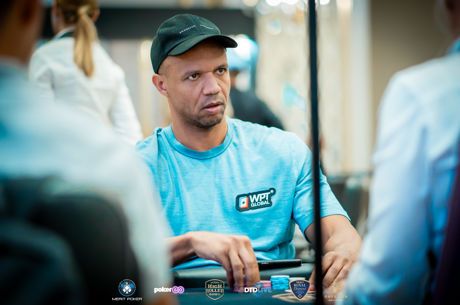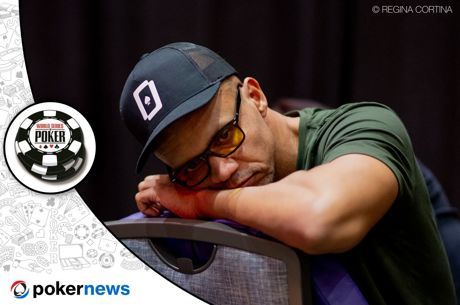Phil Ivey is an American poker player with over $44 million in live poker tournament career earnings, and millions more in profit from playing high-stakes cash games. Many of Ivey's peers consider him the best poker player of all-time, due to his ice-cold demeanor and his ability to win in every known poker format and variant. He was inducted into poker's Hall of Fame in 2017.
Ivey has one World Poker Tour (WPT) title to his name, and 11 World Series of Poker (WSOP) bracelets to be second on the all-time bracelet list ahead of ten-time bracelet winners Erik Seidel, Johnny Chan, and the late Doyle Brunson. Only Phil Hellmuth (17) has more bracelets than Ivey.
After a ten-year bracelet drought, Ivey won his 11th bracelet at the 2024 WSOP in Event #29: $10,000 2-7 Triple Draw Championship.
“It’s good. It feels good. It feels good to win always," Ivey told PokerNews. “I’m motivated. If I can play I will."
He has previously been embroiled in legal wranglings with several casinos after being accused of "edge sorting" during nosebleed stakes baccarat games. All legal proceedings ended in July 2020, six years after they begun.
Phil Ivey Background
Phil Ivey was born on February 1, 1977, in Riverside, California, but his family moved to Roselle, New Jersey, when he was a baby. Ivey discovered poker while working for a telemarketing company in New Brunswick, New Jersey, in the 1990s, and began playing poker in Atlantic City, New Jersey.
When he began playing live poker, Ivey was 18 years old, but New Jersey's legal gambling age is 21. He used a fake ID under the name Jerome Graham, and he played so frequently that other players nicknamed him "No Home Jerome." Ivey would later be called "the Tiger Woods of Poker."
Although primarily a cash game player, Ivey ventured into the world of poker tournaments in 2000, winning a $540 buy-in Limit Hold'em event in Tunica. His first appearance at the WSOP was also in 2000; he returned home having cashed three time, reached two final tables, and won the first of his ten bracelets; he took down the $2,580 Pot-Limit Omaha event.
READ MORE
Phil Ivey and Andrew Robl Post $2.5 Million Bail, But Fail to Free Paul Phua and Son
Divorce Drama Reveals Phil Ivey made $920,000 a Month from Tiltware
Phil Ivey Reportedly Settles With Borgata, Ending 6-Year Legal War
Phil Ivey Twitter
You can follow Phil Ivey on Twitter.
Phil Ivey Instagram
You can follow Phil Ivey on Instagram.
Phil Ivey YouTube
Phil Ivey does not have a YouTube channel.
Phil Ivey Poker History
Phil Ivey's first recorded poker tournament result in an open event was in a $540 Limit Hold'em event at The First Annual Jack Binion World Poker Open in Tunica in April 2000. Ivey outlasted 296 opponents and won $53,297. Later that year, Ivey headed to the 2000 WSOP, cashing in three events, including winning the $2,580 Pot-Limit Omaha event for $195,000 and his first WSOP bracelet.
Ivey won three more bracelets in 2002, and another in 2005. In November 2005, Ivey banked his first seven-figure score, clinching the $1 million top prize in the $25,000 No-Limit Hold'em event at the Monte Carlo Millions. Ivey was involved in one of the greatest poker hands of all time during his heads-up battle with Paul Jackson of the United Kingdom.
In February 2008, Ivey became a World Poker Tour (WPT) champion, triumphing in the $1,000 L.A. Poker Classic. He collected a career-best, at the time, $1,596,100.
At the 2009 WSOP, Ivey captured another two bracelets before reaching the final table of the $10,000 Main Event, where he finished seventh for $1,404,014.
An eighth bracelet found its way to Ivey in 2010.
In 2012, at the Aussie Millions, Ivey came out on top in the A$250,000 Challenge, taking home A$2,000,000 ($2,058,948), another lifetime high. Two years later, Ivey won the same tournament in Melbourne, but this time it was worth a cool A$4,000,000 ($3,582,753), which remains his best-ever single haul from a tournament.
Australia proved a happy hunting ground for Ivey, as he won his ninth bracelet at the inaugural WSOP Asia-Pacific in 2013. He won his tenth bracelet in Las Vegas the following year. Amazingly, none of Ivey's bracelets have come from playing No-Limit Hold'em.
Ivey's volume waned from mid-2014 through to 2018, partly because of legal issues stemming from some high-stakes baccarat sessions. However, he returned with a bang, frequenting the Triton Super High Roller Series around the world, now seemingly set on only playing tournaments with the highest buy-ins.
In June 2022, Ivey finished second in the $100,000 No-Limit Hold'em High Roller at the WSOP in Las Vegas, narrowly missing out on an 11th bracelet.
Phil Ivey's WSOP Bracelets
| Year | Tournament | Entries | Prize | |
| 2000 | $2,500 Pot-Limit Omaha | 100 | $195,000 | |
| 2002 | $1,500 Limit Seven Card Stud | 253 | $132,000 | |
| 2002 | $2,500 Limit Seven Card Stud Hi-Lo | 126 | $118,440 | |
| 2002 | $2,000 Limit S.H.O.E. | 143 | $107,540 | |
| 2005 | $5,000 Pot-Limit Omaha | 134 | $635,603 | |
| 2009 | $2,500 No-Limit 2-7 Lowball Draw | 147 | $96,367 | |
| 2009 | $2,500 Omaha/Seven Card Stud Hi-Lo 8 or Better | 376 | $220,538 | |
| 2010 | $3,000 H.O.R.S.E. | 478 | $329,840 | |
| 2013 (WSOP APAC) | A$2,200 Mixed Event (8-Game) | 81 | A$51,840 | |
| 2014 | $1,500 8-Game Mix | 485 | $166,986 | |
| 2024 | $10,000 Limit 2-7 Triple Draw Championship | 149 | $347,440 |
Is Phil Ivey Good at Poker?
Phil Ivey is an incredible poker player who is respected and feared in equal measure. His unrelentless aggression, coupled with elite-level hand-reading abilities, makes him a formidable opponent at the poker tables.
Unlike some of his peers, Ivey does not specialize in No-Limit Hold'em, and is equally dangerous playing in mixed games. Indeed, all of Ivey's ten bracelets have come in non-Hold'em events.
Ivey does not only play high-stakes tournament poker but also cash games with the highest buy-ins. He is famous for being part of "The Corporation," who played against billionaire businessman Andy Beal in May 2014. During Ivey's one-on-one session against Beal, stakes went as high as $50,000/$100,000, and Ivey ran out a $16.6 million winner.
Phil Ivey's Top Five Live Poker Results
| Date | Event | Rank | Prize |
|---|---|---|---|
| Feb 2014 | A$250,000 Challenge | 1st | A$4,000,000 (US$3,582,753) |
| Jan 2012 | A$250,000 Chalenge | 1st | A$2,000,000 (US$2,058,948) |
| Feb 2015 | A$250,000 Challenge | 1st | A$2,205,000 (US$1,710,854) |
| May 2018 | HK$1,000,000 Short Deck | 3rd | HK$13,082,000 (US$1,666,480) |
| Feb 2008 | $10,000 LA Poker Classic | 1st | $1,596,100 |
Wealth – What is Phil Ivey's Net Worth?
Like most poker players, Phil Ivey is secretive about his net worth, but he is estimated to be worth around $125 million. Ivey has won over $42 million from live poker tournaments and countless more millions from grinding high-stakes cash games. Throw into the mix business ventures, table games, and sports betting, and the sums quickly add up to nine figures!
How Did Phil Ivey Make His Money?
Phil Ivey made the bulk of his money through playing poker and being an excellent player. Ivey has long played cash games for the highest stakes and once banked $16.6 million profit in one well-documented heads-up session.
Ivey is also known for sports betting, prop betting—particularly in golf—and playing table games, where he fell foul of advantage play in New Jersey and British casinos.
Ivey also has several business venture, including Ivey Poker play money online poker site, and the now-defunct Ivey League training site. In April 2023, Ivey sued NuVeda, a Las Vegas cannabis dispensary, for $1.9 million.
Phil Ivey Family, Wife, and Children
Phil Ivey prefers to keep his personal life private but sometimes finds that challenging because of his superstar status in the poker world.
Luciaetta Ivey - Phil Ivey's Ex-Wife
Phil Ivey was married to Luciaetta for seven years until the couple divorced in December 2009. Luciaetta Ivey received a purse collection worth more than $1.2 million, jewelry worth over $1 million, and $180,000 a month in alimony as part of her divorce settlement.
Does Phil Ivey Have Children?
At the time of writing, Phil Ivey does not have children.
Phil Ivey Controversies
Phil Ivey has been involved in several controversies during his career, most notably being part of the team behind Full Tilt Poker, which shutdown under black clouds. Court papers revealed Ivey received $920,000 from TiltWare, the company behind the online poker site that went belly-up, yet he remained silent while thousands of players thought their bankrolls were forever lost until PokerStars came to the rescue.
Ivey found himself caught up in an edge-sorting scandal while playing high-stakes baccarat with a female friend. Ivey and his companion won several million dollars in Atlantic City and in the United Kingdom, but the casinos refused to pay out his winnings, accusing him of advantage play. Although edge-sorting is not illegal, it is frowned upon. Judges ruled in favor of the casinos, and Ivey settled the case in July 2020, some six years after legal proceedings began.
More recently, in April 2023, Ivey sued NuVeda, LLC, a Las Vegas cannabis dispensary, for $1.9 million. Court papers show Ivey exchanged almost $2 million for 3% equity in the company. The company promised Ivey 23% interest, equating to $1.75 million, but he only received $250,000. NuVeda has since filed for bankruptcy.
Phil Ivey FAQs
How much money has Phil Ivey won playing poker?
Phil Ivey has won over $42 million from live poker tournaments, and many untold millions playing high-stakes cash games. Before Full Tilt closed its doors, Ivey was $20 million in profit in cash games at the online poker site.
How many World Series of Poker bracelets does Phil Ivey have?
Phil Ivey has won ten World Series of Poker (WSOP) bracelets since 2000. However, Ivey is currently enduring a bracelet drought, having not won one since 2014.
What is Phil Ivey's Net Worth?
Phil Ivey has an estimated net worth of $125 million.
Is Phil Ivey married?
Phil Ivey was married to Luciaetta Ivey for seven years, but the couple divorced in 2009.
Did Phil Ivey cheat at baccarat?
Phil Ivey used a technique known as "edge-sorting" while playing high-stakes baccarat. Although not technically cheating, it is considered an advantage play and, therefore, unethical

 28:14
28:14  02:36
02:36  11:32
11:32  09:23
09:23  03:05
03:05  01:50
01:50 
















